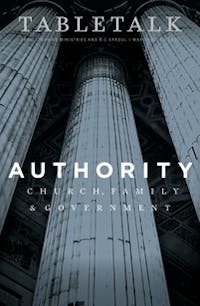
Request your free, three-month trial to Tabletalk magazine. You’ll receive the print issue monthly and gain immediate digital access to decades of archives. This trial is risk-free. No credit card required.
Try Tabletalk NowAlready receive Tabletalk magazine every month?
Verify your email address to gain unlimited access.
It is a rather tedious and tiresome thing to pull the legs out from under our national confession. Our country’s creed is not just internally inconsistent, nor is it just incomprehensible, it is both these things. That is, it does not start out with the fundamental premise, build a string of thirty or so syllogisms and come to a conclusion that contradicts the premise. You start with A, blink, and non-A is staring you right in the face. Our national creed is this: There is no such thing as true and false. The refutation is this: Is it true or false that there’s no such thing as true or false? It’s over already. As I already noted, this devastating critique is by this point both tedious and tiresome. Potent and compelling, yes, but still boring as soggy graham crackers.
That this creed hasn’t a leg to stand on doesn’t keep it from being the very pillar of our society. Not a stable pillar, of course, but, then, we are no longer living in a very stable society. The more interesting question is this: How did an idea so utterly foolish come to be the very foundation of our culture? Why would a people, especially a people so given to intellectual pride, embrace such obvious folly? Because we’re foolish enough to believe that such will allow us to escape the call of God on our lives. Because while we profess ourselves to be wise, God gives us over to the foolishness of our own thinking (Rom. 1:22).
Relativism is not driven by honest epistemological skepticism. That is, its impetus isn’t the result of uncertainty about truth. It is driven instead by ethical perversion. It exists not in the end so that we can escape truth per se, but that we might escape a particular truth — that we are sinners in rebellion against God. We deny that there is truth, so that we can deny that there is a truth to which we must give an answer. It is an attempt to escape from authority.
As is so often the case, the folly that infects the world soon infects the church. According to George Barna, fifty-four percent of those who profess to be evangelicals also agree that there is no objective true and false. That evangelicals believe this is as absurd as the notion that there is no objective true and false. Evangelicals, by definition, are those who affirm the objective truth of the evangel (the gospel). But this is not the only way relativism assaults the church. It infects our understanding of the Bible itself. We come to the Word of God not to find out what God says but to find out what it says “to me.” We open our Bibles not to find “thus saith the Lord” but to find grist for our own mills, to affirm “thus is what it means to me.”
Those of us in the Reformed camp, while hopefully not falling for this folly, have at least failed to fight it well. To be sure we have our share of worldview gurus who are willing and able to refute this nonsense. Such we ought to be doing. But we spend most of our time manning the barricades against assaults on the sovereignty of God. Charismatics speak of the Holy Spirit. Dispensationalists write about the end times. The Reformed talk about God’s sovereign power.
Of course it is good and wise to speak about the Holy Spirit, as long as we are speaking biblically. It is right and proper to write about the end times, as long as we are writing biblically. It is sound and fitting to talk about God’s sovereign power, as long as we are talking biblically. What we tend to skip lightly over, however, is God’s sovereign authority. That when He speaks the winds and the waves obey manifests not just His power but His rule. He is God Almighty, there is no other. When He speaks, He need not persuade us of what He says. He need not overpower us either. Instead, because He is the Creator and we but creatures, when He speaks we must ever and always reply, “Amen.”
While it is certainly true that the modern, or should I say postmodern church suffers from acute worldliness, that we stumble because we follow the world, the broader reality is that the world follows us. That is, we do not fail to submit to God’s Word because they out there are relativists. Instead, they are relativists, not submitting to God, because we first do not submit to Him. If we want to live in a world where authority is recognized and honored, we need to be a holy nation, a royal priesthood, a people that bow before God’s Word. The world will continue to collapse until the church learns, within her own walls, to be more faithful.
Jesus said as much when He, with all authority, commanded us all to seek first His kingdom and His righteousness. Our first calling is to get our own house in order, to become sons and daughters who honor our Father. When that happens, and only then, all these things will be added unto us. All that we worry about, or even all that we hope for — including a better, sounder, safer, broader culture — will then come to pass. First, however, we must get first things first. Our sound refutations of foolish worldviews will get us nowhere until we submit to all that He has said. Submission is our mission. Let God be true and every man a liar.
